7 Practical ways to battle the post-event blues
After months and months of planning, your event is getting nearer and nearer: the days get longer, and the need for you to be on top of everything is pushing you ever closer to the brink of your ability.
You haven’t had time to see your friends or family in days, maybe even weeks.
You haven’t had any down time, and you’ve barely had enough time to shower and sleep let alone take optimum care of yourself.
You keep telling yourself: “Just a few more days…a few more days….then this will all be over.”
And then, just like that: it is over.
But instead of a wave of relief and feeling or elation: you feel the exact opposite.
Even if the event was a complete success, you feel proud of the work you’ve done, and your client or organization were impressed with your work: you can’t help but have this low, empty, and depressed feeling.
What is happening, and more importantly, how do you deal with it?
What causes post-event blues?
Don’t worry: you are not alone. Many professionals have these feelings from time to time.
Post-event let down, post-project depression (PPD), or post-adrenaline blues are actually very common in people whose work fluctuates greatly over time.
As opposed to work that is steady and the daily demands remain consistent: with a project’s whose demands crescendo, emotional fallouts after the climax are common.
While it is a well known to occur with athletes after a high-level competition: it is also common with musicians, performers, filmmakers, and writers: basically any position where optimal results require to dedicating a lot of energy and attention, mentally or physically preparing and training, up to a certain point, and then suddenly, it is over. This including planning or speaking at an event.
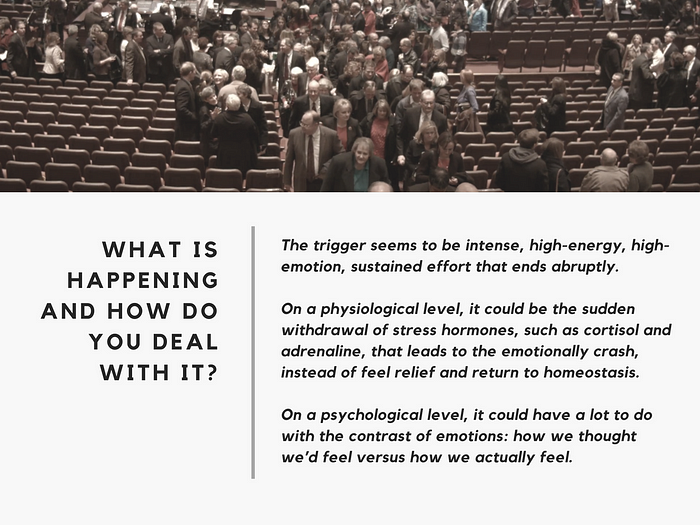
The trigger seems to be intense, high-energy, high-emotion, sustained effort that ends abruptly.
On a physiological level, it could be the sudden withdrawal of stress hormones, such as cortisol and adrenaline, that leads to the emotionally crash, instead of feel relief and return to homeostasis.
On a psychological level, it could have a lot to do with the contrast of emotions: how we thought we’d feel versus how we actually feel. Psychologist Eileen Kennedy offers insights from her article on Psychology Today; “Post-Adrenaline Blues”:
“It stems from the contrast between how we expected to feel when “the big event” was over and how we actually feel. Maybe it’s about just feeling at loose ends, not sure what to do with ourselves, because something that has been the overriding organizing focus of our lives is now past. We tell ourselves, “I just have to make it to Friday, and this will be over!” But the jubilation at being done is often quickly followed by a sense of letdown.”
-Eileen Kennedy-Moore Ph.D.
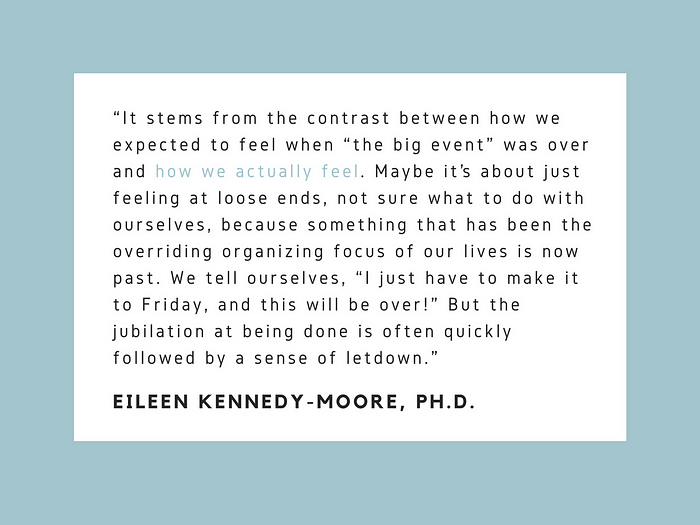
What to do about it?
The good news is that post-event blues tend to be temporary, lasting from a few days to a few weeks: and there are handful of ways that you can speed up your recovery time.
Most importantly: be kind to yourself and treat yourself gently.
Rest.
Eat well.
Focus on your health and find ways to de-stress.
And whatever you do, do not to make any major life decisions until you are well rested and your hormones and energy levels have normalized.
7 practical ways to deal with post-event blues
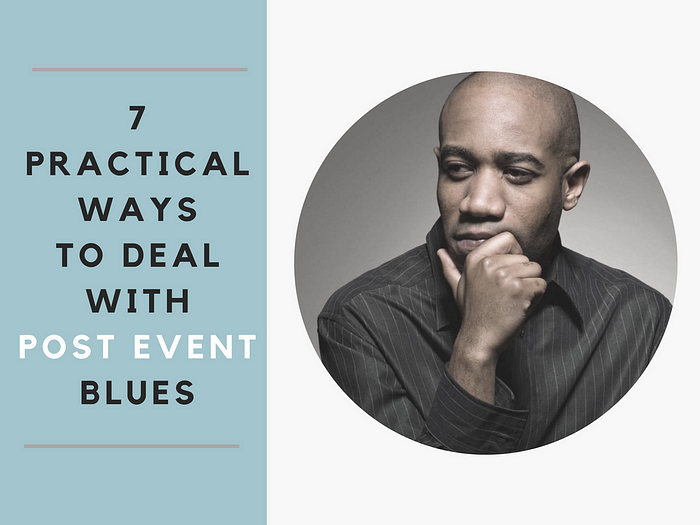
1. Gratitude thinking

Studies have shown that gratitude thinking can substantially shift our thought patterns from negative to positive, cause a surge of feel good hormones like serotonin, dopamine, and oxytocin, and help us foster more positive connections with the people in our lives.
So pick yourself up by practicing being thankful, and spending some time showing gratitude.
For example, write personalized emails and thank you notes to the event attendees, staff, volunteers, other speakers and organizers, and vendors.
Or write a recap on everything that went well, and how you are grateful for everyone and everything that helped the event be a success.
This can also help foster more positive connections for future events, while leaving you feeling better, and ready to move on to your next project.
2. Sift through the feedback while it is fresh
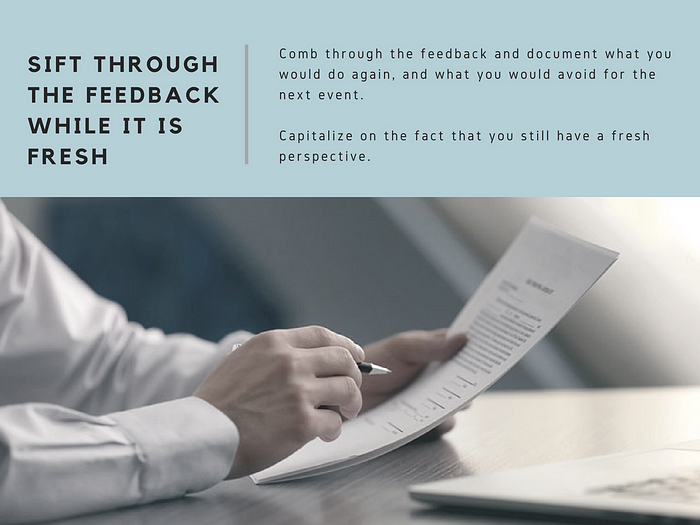
Gather feedback, either by email, phone calls, social media polls, meetings, or a survey, from the attendees, online participants, speakers, organizers, staff, and the organization to find out what worked, and what didn’t at the event.
Here are some starter questions you can use:
- How satisfied were you with the event/talk?
- In your opinion, did the conference/talk meet its objectives?
- What did you like most about the event/presentation?
- What did you like least about the event/presentation? What would have made it better?
- How well was the conference structured?
- How useful was the information presented?
- How likely are you to attend/host/speak at one of our events in the future?
Then analyze data.
Comb through the feedback and document what you would do again, and what you would avoid for the next event.
Capitalize on the fact that you still have a fresh perspective, something that will shift, fade and change by the time it comes to planning the next event.
3. Wrap it up properly
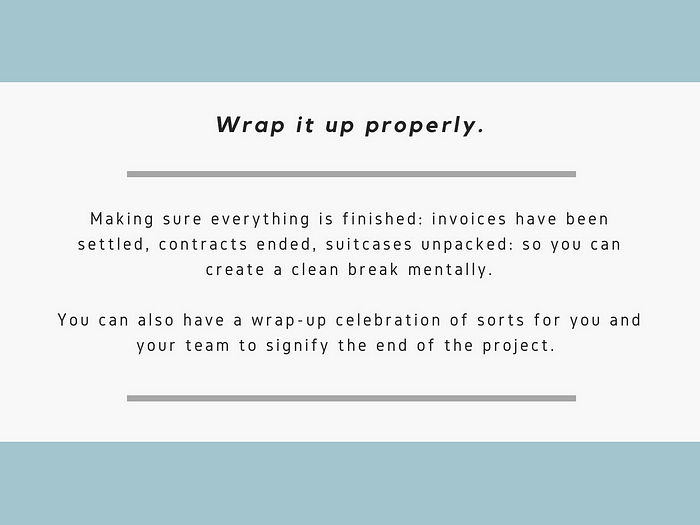
While it might be tempting to jump straight away into your next project, take sometime to properly wrap up the event.
This means making sure everything is finished: invoices have been settled, contracts ended, suitcases unpacked: by making sure you don’t have any lingering tasks, you can create a clean break mentally.
You can also have a wrap-up celebration of sorts for you and your team, partially as a thank-you and partially to signify the end of the project.
4. Take a few days to recover, relax, and reward
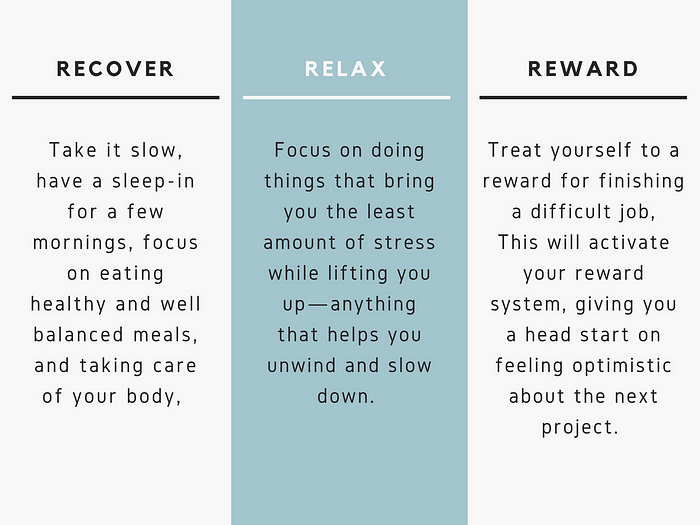
Within a few days after the event ends, take a break to recover, relax, and reward yourself for a job well done. How long you take is up to you, but setting some special time aside for yourself can help you regroup and get back on track.
- Recover: Imagine yourself as a runner who has just completed a marathon, and treat yourself kindly directly after the event.
Take it slow, have a sleep-in for a few mornings, focus on eating healthy and well balanced meals, and taking care of your body, by do some low-intensity exercise: like a taking walk in nature, or spending the day at a wellness resort, getting a massage, or taking a restorative yoga class.
- Relax: Rest your mind and body. Your mind might feel like it has gone through a grueling ordeal, and it may needed some time to rest.
Focus on doing things that bring you the least amount of stress while lifting you up, like going to the movies or a concert, or spending time with friends, or relaxing at home with a good book — anything that helps you unwind and slow down.
- Reward: You can start thinking about this before the event is finished: what is something you’ve been desiring that would bring you a burst of happiness and pleasure?
At the end of the event, go ahead and treat yourself to a reward for finishing and doing a great job.
An additional benefit it this will also activate your reward system, and give you a head start on feeling optimistic about the next project.
5. Connect with your friends and family
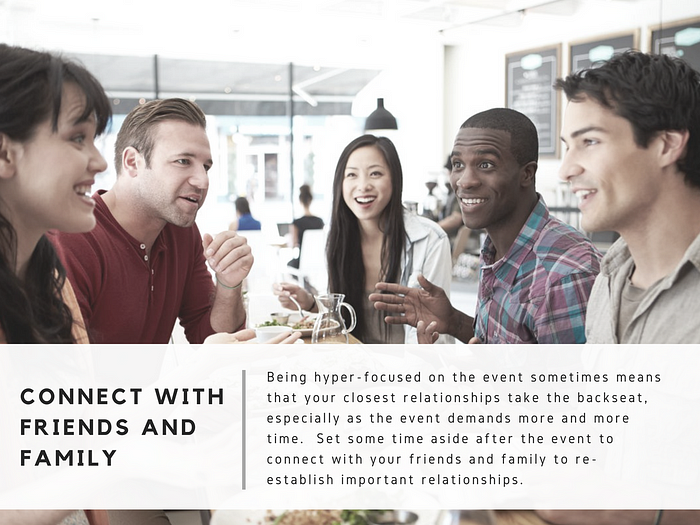
Being hyper-focused on the event sometimes means that your closest relationships take the backseat, especially as the event demands more and more time.
Set some time aside after the event to connect with your friends and family, you might even consider taking a short holiday together.
While they might not understand why you feel low after the event, talking about it can help alleviate some of the stress.
However, avoid dumping a lot of negativity on them, or incessantly complaining about what went wrong: after weeks of not seeing you, this is probably not going to help strengthen your relationship.
Be clear about how you are feeling, and then spend some time actively listening to what has been happening with them over the past few weeks.
6. Re-introduce routine
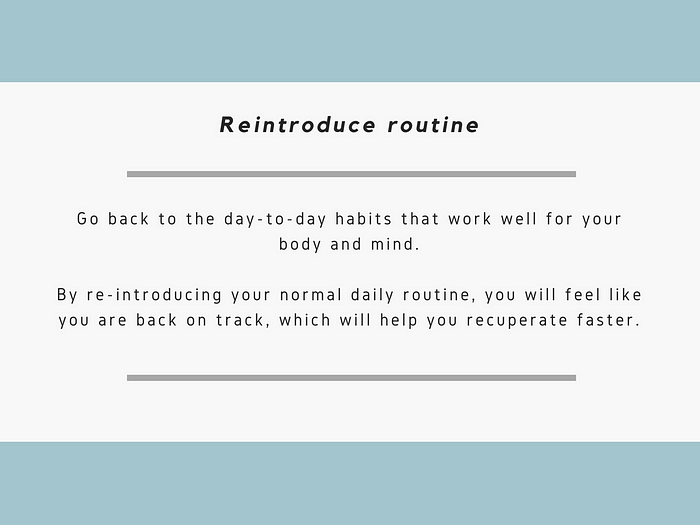
Your daily or weekly routine is usually one of the first things to go as the demands of the event begin pressing.
Maybe you exercise less, or stay up late, or have to travel more than usual, sometimes through different time zones — it can feel like a mental and physical rollercoaster.
Go back to the day-to-day habits that work well for your body and mind.
By re-introducing your normal daily routine, you will feel like you are back on track, which will help you recuperate faster.
7. Set new goals
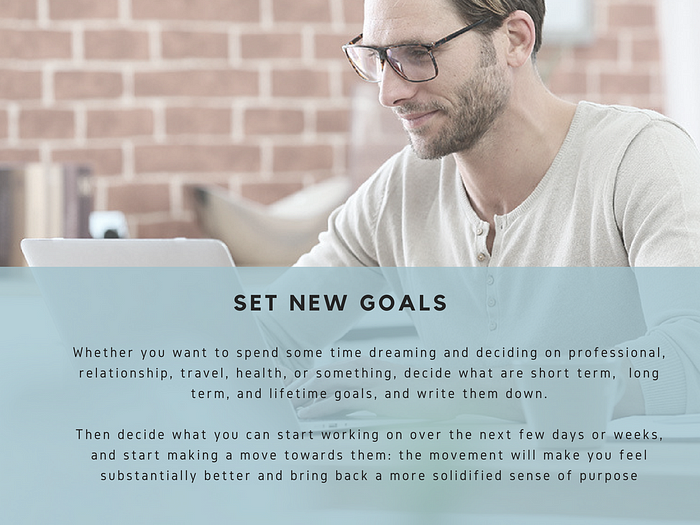
Many people suffering from post-event blues have a sense of purposelessness or apathetic after the event has past.
Bring purpose back into the picture by setting goals — looking towards what you want in the future can motivate you to kick the blues to the curb.
Whether you want to spend some time dreaming and deciding on professional, relationship, travel, health, or something, decide what are short term, long term, and lifetime goals, and write them down.
Then decide what you can start working on over the next few days or weeks, and start making a move towards them: the movement will make you feel substantially better and bring back a more solidified sense of purpose.
Taking further steps to feel better
Even if you absolutely love what you do: highs and lows are normal and can happen no matter how long you’ve been doing your job.
By learning how to manage the high and lows effectively, you can bounce back to the stress-free zone faster, and lessen the risk of burn out or breakdown.
Instead of letting it take you by surprise after each big event, forsee that when the event ends, that you might have a wave of these feelings.
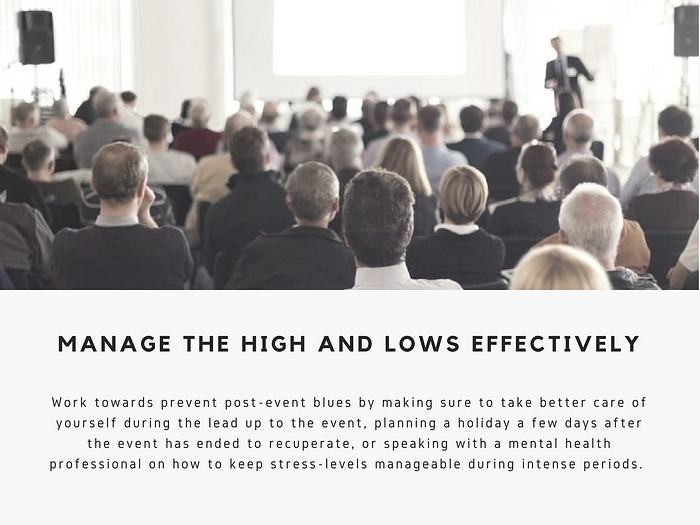
Work towards prevent them by making sure to take better care of yourself during the lead up to the event, planning a holiday a few days after the event has ended to recuperate, or speaking with a mental health professional on how to keep stress-levels manageable during intense periods.
This was originally posted on the SpeakerHub Skillcamp.
